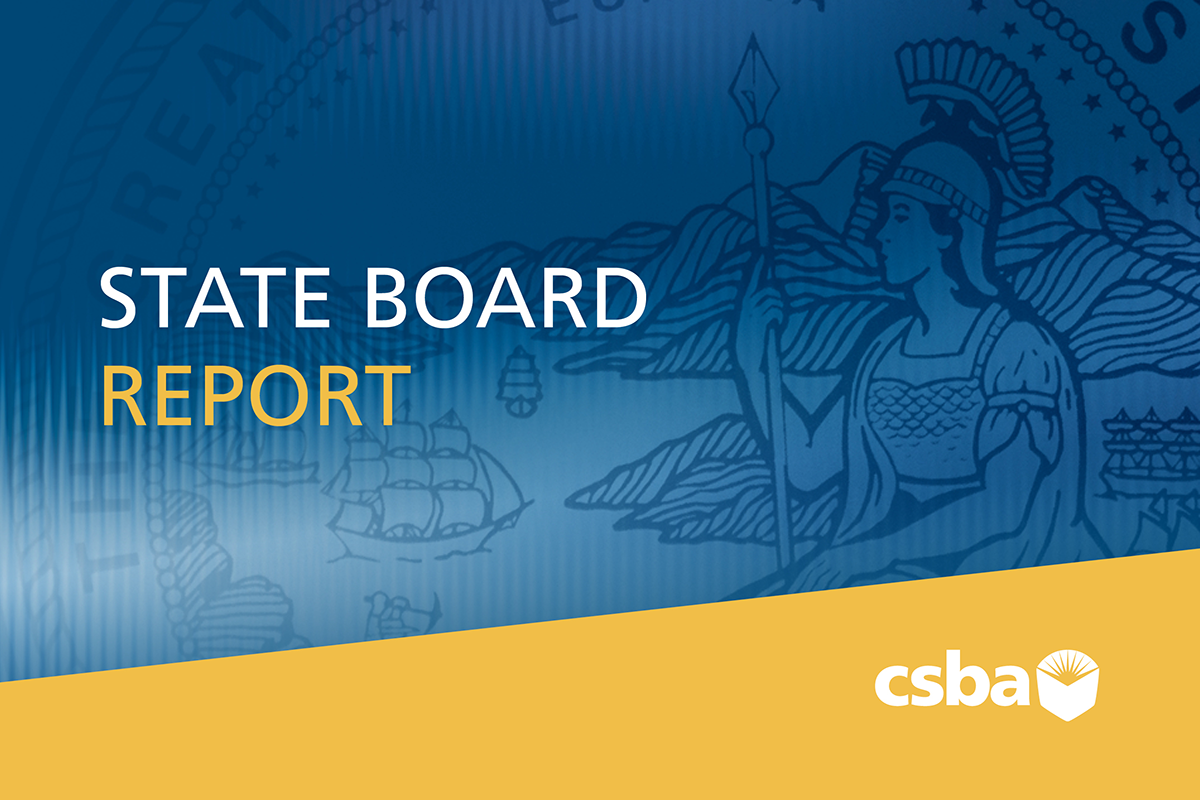by Teri Burns, Senior Director, Policy and Programs
The State Board of Education (SBE) met in Sacramento on July 10 and 11 with much of the agenda appropriately consumed with issues relating to Common Core State Standards (CCSS) implementation, changes to the state assessment system and the newly adopted Local Control Funding Formula (LCFF). For a quick overview, tune into our This Just In feature to learn more.
Common Core implementation
On Wednesday, July 10, the Board spent most of the morning with reports on the activities of county offices of education in training teachers and administrators on the administration of Common Core State Standards (CCSS) curricula and preparation for the new Smarter Balanced Assessment Consortia (SBAC) assessments. Sacramento County Superintendent Dave Gordon stressed that it is critical to tie the CCSS and the new tests as we roll out a new way of delivering education.
The County Superintendents Association (CCSESA) is currently doing an assessment of district Common Core readiness and district technology needs to fully implement the SBAC. The results should be available this fall. CCSESA are also developing a leadership planning guide and checklist, as well as identifying best practices from the early adopters.
Along with these tools, the California Department of Education has published guidance to districts on how to do outreach to various communities and has translated documents for that purpose. They recommend reviewing that advice before spending your share of the $1.25 billion one-time money appropriated for CCSS implementation efforts.
New Science Curriculum Standards Adoption
Next Generation Science Standards took up the rest of the morning on July 10 with 21 speakers from a cross-section of business, labor, parents, educators and community groups speaking in favor of adoption. Representatives from the Association of California School Administrators (ACSA) spoke in favor of delaying adoption until fall, so that educators could fully review and comment on the revised middle-school learning progressions. The board held the item to allow for the thorough review.
Local Control Funding Formula
After lunch, discussion moved to the newly approved Local Control Funding Formula (LCFF) for school finance. AB 97, the bill implementing the new system, contains some very strict guidelines for district action and development of an accountability system to ensure that the students generating additional funds in the plan benefit from that funding.
Districts need to begin quickly to set annual goals for achievement, strategies to reach those goals and priorities for both academic performance and school climate. By July 2014, districts will need to submit a Local Control and Accountability Plan (LCAP) following a format/content template to be adopted by the SBE next March. In the meantime, boards need to be accountable for how they spend current year funds in alignment with the intent to serve the populations that generate them. Now is the time to be determining what your goals are and getting parent input on how best to reach those goals by allocating resources. The issue of engaging parents and students in those decisions was raised repeatedly by both SBE members and members of the public. It seems like such an obvious way to build buy-in. Ask folks what they think they need and really listen to those requests.
LCFF will impact every aspect of district operations. Boards should be ready to share input on what the accountability system for this new funding formula should include at regional input sessions this August that will be facilitated by WestEd or in writing. CSBA will be at the table for small focused advisory group meetings with the statewide stakeholders to offer input as the board and CDE work to prepare the final version. Boards shouldn’t wait though. CDE will be coming out soon with a communications plan about the LCFF and the expectations for improving student achievement in all subgroups are clearly laid out in the law. CSBA is beginning to develop briefs, webinars and other resources to share specifics about the law and best practices, including a strand at the Annual Education Conference and Trade Show in December.
The update on the Smarter Balanced assessments included an announcement that Arne Duncan, education secretary for the U.S. Department of Education, will consider a waiver request to allow students who take the SBAC field test next year to not be required to double test. That would be great for us. It would allow us to maximize the number of students who take the field test (currently 20 percent were estimated to take it) and would allow time to expose many more teachers and students to the new test. More importantly, those schools taking the SBAC field test would simply have their Annual Yearly Performance (AYP) rolled forward one year – everyone would stay in the same place on sanctions and interventions. Since the target for 2014 is 100 percent proficient, this could help a number of districts avoid program improvement for the year.
There was also a lot of discussion surrounded the issue of cost and what test system the state would buy. Current numbers offered by the CDE estimate $58 million for the annual test and $67 million if you include interim and formative assessments. CSBA advocated that the state purchase the full system and avoid the duplication of having each district purchase or develop their own interim and formative tools.
While most of the education and civil rights folks are advocating for purchasing the full system, the board is requesting a full comparison of the costs of the system at build out and what the trade-offs would be if another option is chosen. Expect more discussion at subsequent SBE meetings about the purpose of the test, long-range plan for testing a variety of subjects and reporting results, and the tradeoffs associated with the test purchasing options.
Thanks to all of our Delegate Assembly members who responded to our survey on these very issues for allowing us to have your most current thinking as we go into this dialogue.
Waivers
Finally, one note on waivers. In considering class size cap waivers, SBE Member Carl Cohn asked if these should be going away with the implementation of LCFF. Deputy Superintendent Rich Zeiger suggested that it is time to re-examine their criteria for these waivers given the additional funding provided at K-3 for class size reduction under LCFF. The next few months will be a learning process for CDE on this issue and thus for all of us.
See, I told you, LCFF will impact every aspect of what we do!






Be the first to reply